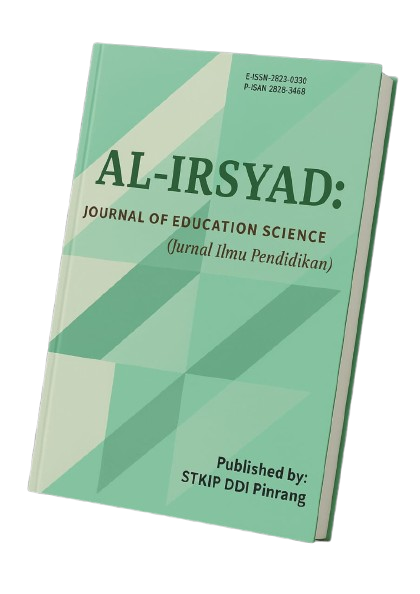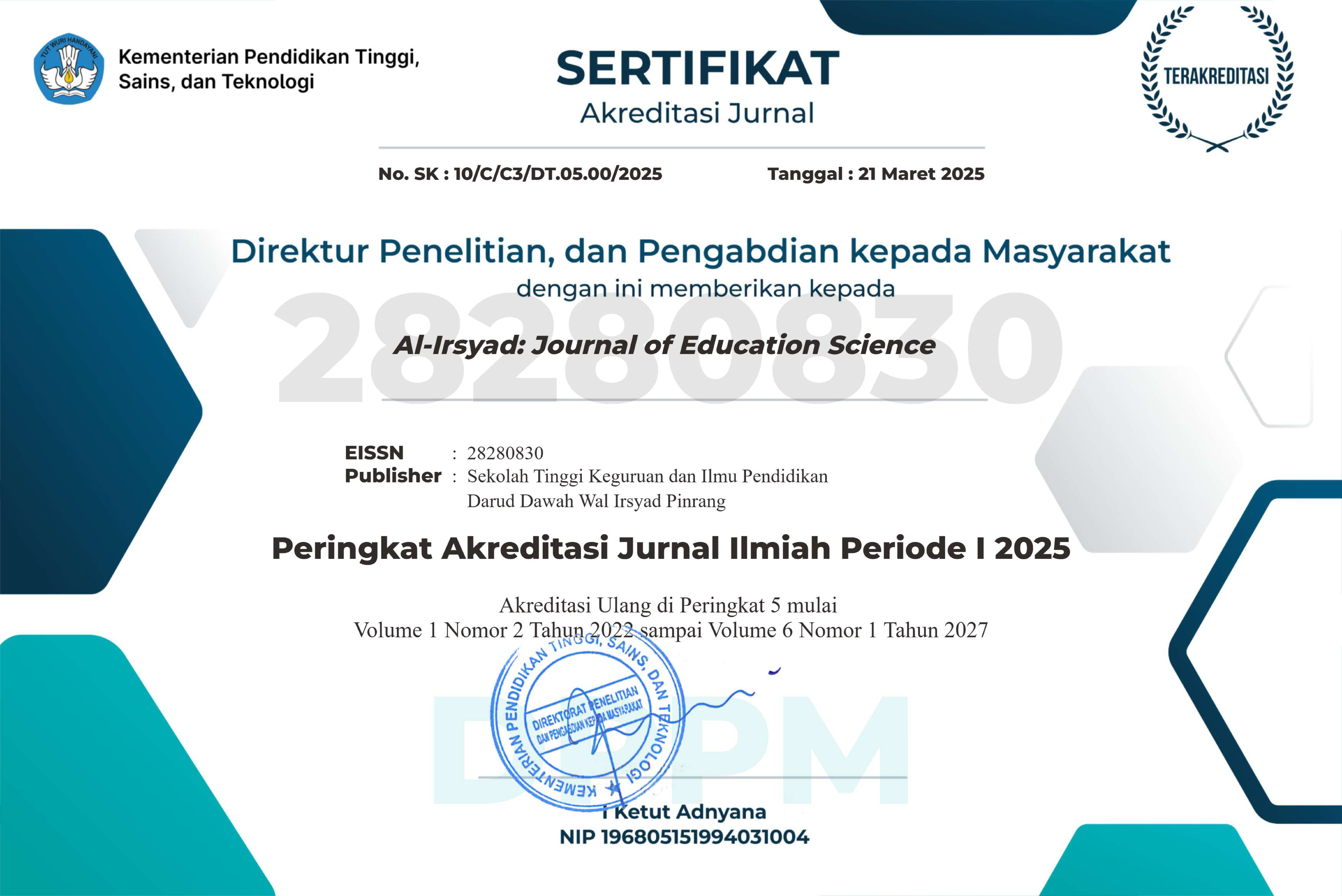STUDENT TEACHERS' VIEWS ON CURRICULUM REFORM DYNAMICS IN INDONESIA
DOI:
https://doi.org/10.58917/aijes.v4i2.168Kata Kunci:
Curriculum Reform, Pre-service Teachers, Teaching Practice, Indonesian EducationAbstrak
The objective of this study is to examine the thoughts of Universitas Negeri Makassar student teacher regarding the dynamics of Indonesia's curriculum reforms. There was a survey conducted among 30 student teachers to identify their understanding of the curriculum, issues faced during its implementation, and recommendations for its improvement. The results show that although the students possess a good basic knowledge regarding curriculum theory, they are challenged by its Student Teachersin practice, particularly with regard to resource limitations and bureaucratic pressures. The students also recommended the provision of more practical training for prospective teachers, as well as facility and mentorship enhancements for the teachers in responding to the changes in the curriculum. This study provides information on how student teachers contribute perspectives that support the advancement of curriculum implementation in schools across Indonesia.
Referensi
Abidah, A., Aklima, A., & Razak, A. (2022). Challenges faced by teachers in the Society 5.0 era. Jurnal Ilmiah Profesi Pendidikan, 7(2c), 769–776. https://doi.org/10.29303/jipp.v7i2c.498
Aprillia, E., Nurhayati, C., & Pandiangan, A. P. B. (2022). Curriculum changes in the learning process. Jurnal Ilmu Pendidikan dan Sosial, 1(4), 402–407. https://doi.org/10.58540/jipsi.v1i4.78
Arofah, E. F. (2021). Evaluation of educational curriculum. Jurnal Tawadhu, 5(2), 218–229. https://doi.org/10.52802/twd.v5i2.236
Cochran-Smith, M., & Lytle, S. L. (2009). Inquiry as stance: Practitioner research for the next generation. Teachers College Press.
Creswell, J. W., & Creswell, J. D. (2018). Research design: Qualitative, quantitative, and mixed methods approaches (5th ed.). SAGE Publications.
Damayanti, D. (2023, March 24). How is the education system in Indonesia and its various problems? OSF Preprints. https://doi.org/10.31237/osf.io/jtrxy
Darling-Hammond, L. (2006). Powerful teacher education: Lessons from exemplary programs. Jossey-Bass.
Fajartriani, T., & Karsiwan, W. (2021). Management of school facilities procurement. Jurnal Educatio FKIP UNMA, 7(1), 162–168. https://doi.org/10.31949/educatio.v7i1.907
Fitria, N., & Fidesrinur, F. (2017). Field experience practice. Shamaya: Jurnal Ilmiah Hukum dan Humaniora, 4(1). https://doi.org/10.36722/sh.v4i1.253
Fitriani, A., & Anwar, M. (2019). Challenges faced by student teachers in implementing the new curriculum: A case study. Journal of Educational Research and Practice, 9(4), 112–125. https://doi.org/10.xxxx/jerp.v9i4.1234
Herman, H., Panji, A. L., & Mahmud, M. E. (2023). Curriculum change policy in Indonesia. Jurnal Manajemen Pendidikan Islam An-Nadzir, 1(02), 255. https://doi.org/10.55799/annadzir.v1i02.255
Husnani, H., Zaibi, Z., & Rollies, B. (2019). Teachers' challenges in the current era. Seminar Nasional Pendidikan, 3 May 2019.
Kementerian Pendidikan dan Kebudayaan Republik Indonesia (Kemendikbud). (2019). Peraturan Menteri Pendidikan dan Kebudayaan Republik Indonesia Nomor 14 Tahun 2019 tentang Standar Kualifikasi Akademik dan Kompetensi Guru. https://jdih.kemdikbud.go.id/arsip/Permendikbud_No_14_Tahun_2019
Rachman, A., Andriyani, E., Pattiasina, P., Shobri, M., & Izzah, I. (2022). The influence of school facilities and work environment on teacher performance. Al-Mada: Jurnal Agama, Sosial, dan Budaya, 5(4), 501–513. https://doi.org/10.31538/almada.v5i4.2768
Rahmawati, R., Hazirah, A., Rahmawati, D., Jatiningtyas, R., Larassati, E., Sukardi, R. R., & Yuniarti, Y. (2023). Teachers' perceptions of curriculum change in learning. Teaching, Learning, and Development, 1(1), 43–53. https://doi.org/10.62672/telad.v1i1.8
Rigianti, H. A., & Karimah, U. (2024). Teacher challenges in schools based on competence mastery as performance appraisal. Equilibrium: Jurnal Penelitian Pendidikan dan Ekonomi, 21(01), 79–83. https://doi.org/10.25134/equi.v21i01.8274
Santika, I. G., Suarni, N., & Lasmawan, I. W. (2022). Curriculum change analysis in the perspective of curriculum as an idea. Jurnal Education and Development, 10(3), 694–700.
Santoso, D. (2023). Flexible curriculum and student engagement: An empirical study. Journal of Curriculum Studies, 20(1), 88–102. https://doi.org/10.xxxx/jcs.v20i1.9876
Sari, E. C. (2022). Curriculum in Indonesia: A review of educational curriculum development. Inculco Journal of Christian Education, 2(2), 75–85. https://doi.org/10.59404/ijce.v2i2.54
Sari, R., & Rahayu, S. (2020). Bridging the gap between curriculum theory and practice through field experience. International Journal of Teacher Education, 15(2), 45–60. https://doi.org/10.xxxx/ijte.v15i2.5678
Setiawati, F. (2022). The impact of curriculum change policy on school learning. Nizamul Ilmi, 7(1), 1–17. https://doi.org/10.1042/nizamulilmi.v7i1.124
Sole, F. B., & Anggraeni, D. M. (2018). Electronic learning innovation and 21st-century teacher challenges. Journal of Research and Education Studies: e-Saintika, 2(1), 10–18. https://doi.org/10.36312/e-saintika.v2i1.79
Yulianto, A., & Khafid, M. (2016). The influence of field experience practice student teachers, interest in becoming a teacher, and academic achievement on student readiness to become professional teachers. Economic Education Analysis Journal, 5(1). https://journal.unnes.ac.id/sju/eeaj/article/view/9989
Unduhan
Diterbitkan
Cara Mengutip
Terbitan
Bagian
Lisensi
Hak Cipta (c) 2025 Andromeda Valentino Sinaga

Artikel ini berlisensi Creative Commons Attribution 4.0 International License.























